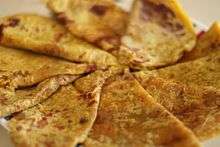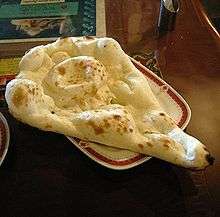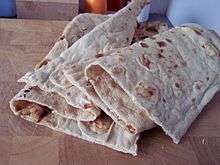Puran poli
|
| |
| Alternative names | Vedmi, holige, obbattu, poli, puranachi poli, god poli, pappu bhakshalu, bobbatlu |
|---|---|
| Place of origin | India |
| Region or state | All of Maharashtra, Gujarat, Goa, Karnataka, Andhra Pradesh, Kerala, Telangana northern parts of Tamil Nadu |
| Serving temperature | Hot (with milk or ghee) |
| Main ingredients | Wheat, sugar, yellow gram |
|
| |

Puran poli, also known as holige, is a sweet flatbread from South India and Maharashtra.
Names
The various names for the flatbread include puran poli (पुरण पोळी) in Marathi, boli (Malayalam/Tamil), bobbatlu/bakshalu (Telugu), holige (ಹೋಳಿಗೆ) and obbattu (ಒಬ್ಬಟ್ಟು) in Kannada, ubbatti, or simply, poli.
History
A recipe for puran poli (as purana) is mentioned in Manasollasa, a 12th-century Sanskrit encyclopedia compiled by Someshvara III, who ruled from present-day Karnataka.[1]
Ingredients
Puran poli is made from chana dal or split yellow gram, plain flour, jaggery or sugar, cardamom powder and/or nutmeg powder, ghee and water. Sometimes toor dal is used in Gujarat. Toor dal or togari bele is commonly used in the state of Karnataka and Tamil Nadu as well. In Andhra Pradesh (bobbatlu or bakshalu) and other places, moong dal, chana dal or even a mix of lentils is used in some recipes.[2] Other ingredients that may or may not be used are: nuts, dates, turmeric powder.[3] [4]
Regional variants
The method of preparation varies from place to place. Sometimes grated coconut is added in Konkan, Maharashtra. Coconut palm jaggery may be used. Similarly a mix or sugar and jaggery can be used as a sweetening agent. Normally nutmeg is used as a flavoring along the coast which is replaced by cardamom or sometimes both elsewhere. Nut, dates, etc. may also be added in this
Methods of rolling the stuffed dough also differ. It can be rolled using rice flour which makes the rolling very convenient. In some recipes flour is not used at all; oil or ghee is used to roll it into a flatbread instead. The rolled bread can be roasted with or without any ghee or oil, which sometimes is smeared after its completely cooked. In some places all-purpose flour dough is used after adding a pinch of turmeric which gives it a traditional yellow color.
The size and thickness of puran puri also varies greatly, in Gujarat where the stuffing used is toor dal, it will be small in size and thickness will be more, where as in holige with coconut stuffing it will be larger in size and with less thickness. Obbattu (ಒಬ್ಬಟ್ಟು) is very popular in Karnataka and is prepared on festival days.[5]
Boli
Boli in Tamil Nadu is a golden yellow sweet pancake from South India.[6] It is eaten during a traditional Sadhya along with Payasam. Several varieties of boli are prepared including thenga (coconut) boli and sharkara (brown sugar). Boli is especially famous in the southernmost districts of Tamil Nadu and Kerala, India.
Boli is eaten mostly after lunch or as an evening snack. Boli looks like a flattened chapathi and is golden yellow in colour. It is popularly sold in trains by the hawkers. "Kadambur boli" is a famous, and it is available in coconut and brown sugar flavors.
Varieties of boli are available throughout the Deccan states.
See also
References
| Wikimedia Commons has media related to Obbattu. |
- ↑ K.T. Achaya (2003). The Story of Our Food. Universities Press. p. 85. ISBN 978-81-7371-293-7.
- ↑ "Pooran Poli / Puran Poli (Holige / Obbattu)". Recipe. Aayisrecipes. Retrieved 19 July 2012.
- ↑ Puran Poli
- ↑ Puran Poli Recipe - A typical Maharashtrian dessert
- ↑ Puran Poli Recipe
- ↑ The Hindu



